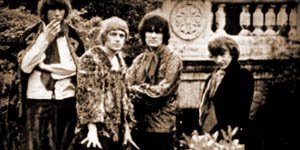The Beat Goes On, Part X.
What I’m doing, just as a reminder, is counting down my own personal Greatest 200 Songs of the 1960s, as inspired by the indie-snob gods at Pitchfork’s own list. For anyone who may just be joining us, start here.
110. The Four Tops “Reach Out (I’ll Be There)”
(Lamont Dozier/Brian Holland/Eddie Holland)
1966
Available on The Ultimate Collection
Just look over your shoulder! If there’s a specific musical identity to the Four Tops (and there should be; uniquely among soul groups, they’ve kept the same lineup for fifty years), this song captures it: the dramatic swelling, the almost-classical harmonic sophistication in the chorus, the stomping beat and James Jamerson’s smoothly percolating bass. Levi Stubbs grabs you by the collar and doesn’t let up from the moment he starts singing; unlike other I’ll-be-there-for-you classics like “You’ve Got a Friend” and “Lean on Me,” there’s nothing hand-outstretched welcoming about this track. It sweeps you off your feet and insists that by God, they will be there, whether you like it or not. And of course, you can’t help but like it.
109. The Byrds “Hickory Wind”
(Bob Buchanan/Gram Parsons)
1968
Available on Sweetheart of the Rodeo
This is harder-core country than just about anything that had been on country radio for a decade. (Assuming Hank Williams as the baseline unit for hardcore country; a fair assumption, no?) Of course, the Byrds being a Dylanesque rock & roll outfit, it’s just as much about the idea of country music (and country living, and country philosophy: for the ultimate wide-cultural articulation of the basic idea begun here, check Michael Landon’s Little House on the Prairie TV show) as much as it is country music itself. That self-awareness has always been part and parcel of rock & roll, if most frequently articulated by Dylan; Parsons’ grasp of the fact that country music could sustain similar mythologizing was his peculiar genius, and brought us where we are today, when the myth is all that’s left because the music has almost disappeared.
108. Randy Newman “I Think It’s Going to Rain Today”
(Randy Newman)
1968
Available on Guilty: 30 Years of Randy Newman
It’s the voice, mainly; the slovenly, straining-even-to-hit-middle-C voice. Although it’s certainly the melody too, and the strings kick in at just the right moment. And the lyrics don’t hurt. But mostly, it’s Randy Newman’s mushmouthed voice that makes this the saddest song ever recorded. You can feel the pain with every line, and at the bridge, it can hit you hard enough to make you flinch. It’s one of his most-covered songs, but the starkness and the dangerous quiet of his debut-album version concentrates every ounce of your attention on his miserable voice. Of course, there’s nothing to say that he meant this song personally (and he probably didn’t); but he’s a terrific actor, and the greatest romantic cynic in popular music.
107. Bob Dylan “Desolation Row”
(Bob Dylan)
1965
Available on Highway 61 Revisited
Most long Dylan songs can be excerpted; Marianne Faithfull did a killer version of “Visions of Johanna” that only included about half the original verses, and of course the Byrds’ “Mr. Tambourine Man” cut out all the stuff that made it about drug dealing. But this song cannot be changed. It’s not a song, in that sense, as much as it is a poem, or a short story in which nothing much happens, but the accumulation of all the little details, all the vignettes and anecdotes and attitudes and images, are all necessary; remove even one and the picture would be incomplete. Which isn’t to say that it’s not a song, too: take some time to listen to it focusing only on Michael Bloomfield’s guitar fills after every line; the degree to which he complements Dylan’s lyrics is breathtaking. Which is one reason the song never feels too long: it’s Eng. Lit. rather than pop (but good, nonetheless), and takes as long as it needs to take.
106. The Melodians “Rivers of Babylon”
(Brenton Dowe/Trevor McNaughton)
1969
Available on The Harder They Come
The greatest example of gospel-reggae that I’ve yet heard. Yeah, of course it’s Rastafarian, but the sound of the song is as much Dixie Hummingbirds as Desmond Dekker. Anyone (I used to be one) who can’t hear the connection between Jamaican music and the American soul of Sam Cooke and Marvin Gaye should hear this song: Brent Dowe’s impassioned, pleading vocals speak for themselves. Although Leslie Kong’s production gets the best moment: during an apparently-extemporaneous line, Dowe’s voice suddenly splits in two, singing “brother” in one ear and “sister” in the other. Psalm 137 hasn’t sounded so good since King David hung up his harp.
105. Simon & Garfunkel “Homeward Bound”
(Paul Simon)
1966
Available on Parsley, Sage, Rosemary & Thyme
You know the dreaded second-album slump? You know, a band that’s worked their asses off for ten years records their debut album and puts the very best of who they are and what they’ve seen into it? And they strike it big, and then suddenly are in demand everywhere, and when it comes time for the second album, all they know anymore is being on the road? This is the grandaddy of all those “life on the road” songs, and Paul got it right the first time. There never needs to be another one. Ever. No, not even you. Ever.
104. John Fahey “When the Catfish Is in Bloom”
(John Fahey)
1967
Available on Requia and Other Compositions for Guitar Solo
Apart from the cool title, there’s not a lot that makes this song special, except for what makes every John Fahey song special: the applying of a classical (or compositional) complexity and structure to American vernacular music. No one since Andrés Segovia has opened up the possibilities of the acoustic guitar as much as Fahey. This is one of his most beautiful pieces, with ideas fit for the concert hall, but retaining a down-home, back-porch atmosphere. You can tell I’m overawed — I’m starting to sound like a breathless Sixties music writer. Perhaps the highlight of the piece is the false ending, where Fahey uses the studio convention of the fade-out as a compostional tool, wrapping it up with just a few spare, elegant notes a moment later. Beautiful.
103. Merle Haggard “The Bottle Let Me Down”
(Merle Haggard)
1966
Available on Hag: The Best of Merle Haggard
Given all the name-dropping of Elvis Costello I’ve done so far, you’d be excused for thinking I chose this song because it’s on his Almost Blue album. You’d be wrong; I first met the song on Emmylou Harris’s debut. But Hag, of course, gets it rightest. Well, he wrote the damn thing, for starters; also, it’s a perfect example of how well he always articulated country-music conventions, even while maintaining an arm’s-length distance from the Nashville oligarchy. (They’d call it “outlaw country” in the next decade; in the Sixties, it was just Hag and Cash.) Oh and one line in the song has an echo in a song futher down the list; can you guess which one it will be?
102. Sly & the Family Stone “M’Lady”
(Sylvester Stewart)
1968
Available on Life
Their best early songs always sounded like a circus band in a discothèque; this is perhaps the pinnacle of that style, with every band member getting a little showcase between verses, from watery organ to fuzz bass to the vocal breakdowns (which heavily inspired funk-gospel a cappella group Take 6) the soprano-sax hook. Nobody’s ever approached Sly & the Family Stone’s unique combination of punchy instruments, vocal explosions, and studio finesse wrapped up neatly in a tidy single-ready package; though Sly was obviously the driving force of the band, it was as much a group effort as anyone, including the Beatles. Hell, Cynthia Robinson deserves a medal for her yowls alone.
101. Soft Machine “Why Are We Sleeping?”
(Kevin Ayers/Mike Ratledge/Robert Wyatt)
1968
Available on The Soft Machine [I]
For a band without a guitarist, they manage to kick up an almighty ruckus. And for the record, Graeme Edge, this is how you incorporate spoken-word poetry into vaguely pompous progressive rock. Kevin Ayers is the focal point here, with his increasingly nonsensical lyrics, but the rest of the band isn’t just sitting around (Robert Wyatt’s drums deserve special mention), and the song swells, distends, and shifts like an underwater earthquake. The roar of the chorus (just the title line, but frantic) is like no other sound in rock music, except maybe bits of King Crimson. The Canterbury scene can be something of an acquired taste, but for those who can dig it, it doesn’t get better than most incarnations of Soft Machine.
Next: 100-091. >>

2 comments:
I didn't expect the Melodians.
Good call.
-rick
"Homeward Bound" is my favorite Simon and Garfunkel song. And that's from someone who really likes Simon and Garfunkel.
Post a Comment